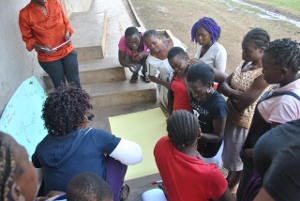
In present day Cameroon, women are still regarded as subordinate to men in almost all aspects of daily life, especially in the
rural villages. National law in Cameroon is not particularly unfair to women, but traditional law is still practiced in most
areas which favours men. We have found land rights to be a major issue in numerous villages and we have chosen to address this
issue in the beginning stages of the project, but we will also address others as we expand and develop the project.
In fact, despite women being responsible for the majority of food security, household management and agricultural production in
Cameroon, they control very little of the land. The current legislation guarantees equal rights for both women and men to buy,
own, use, inherit and dispose of land. However, traditional law in rural areas is still biased against women - as wives, widows,
sisters, daughters, divorced and separated women - limiting their ability to have secure access to land. In most rural areas,
where customary practices prevail, land is owned and controlled by the men; even when they migrate into the city or die, control
is given to a relative/friend or inherited by the heir.
In both situations, the land is entrusted to a male. Although such lands may be at the disposal of the female for small-scale
agriculture, its management cannot entirely be in her hands. Most women are able to rent land, but the uncertainty of their
access limit their choice of crop to seasonal ones that grow quickly which lessens yields and revenue. This lack of control
means that they do not have access or control to the proceeds of agricultural production. If women controlled their land they
would have the power to make decisions on the type of investments on land and its proceeds which can lead to overall poverty
reduction and ensure community livelihood.

Methodology
We adapted the Rural Participatory Appraisal method to the specific context to gather information from rural communities around
Buea. We have held focus groups to gather community specific information from vulnerable women (i.e. widows, single mothers) as
well as community leaders. We also did a mapping activity to identify key locations in the community and their relationship
between each other (mutually beneficial, one-way relationship). We have also held in depth interviews with individuals who had a
special case or specific knowledge in land rights issues. Finally we engaged in participatory observation to analyze the
relationships of diverse community members and the position women hold as well as their role in their community.
Objectives
Enhancing women's rights and supporting their access to land in rural villages of Fako District.
Strategy
We are starting with 3 villages - Tole, Ekona and Bwatingi - to set up the project and ensure our strategies are appropriate and
effective in the context. We will determine what practices work best and then use a network approach to expand to other villages.
We will bring women from villages where the project is established to new villages to share their experiences and knowledge with
the new community.
Goals
- Rural women are organized in networks and are aware on their rights and entitlements.
- Community members understand and comply with legal framework regarding women access to the land.
- Women land titling registration property increased.
Activities
- Conducting research to identify gaps that prevent women from claiming their rights
- Liaise with other organizations and institutions that work with gender issues in Buea.
- Training of 4 Communitarian Promoters in each village
- Workshops on land rights, certificates, capacity building, self-confidence, gender issues
- Inter-village assembly between women (Tole-Ekona Assembly)
- Celebration of the Women's Day
- Communitarian assemblies - meetings to sensitize community members on gender issues
- Legal advising for Land Certificate, Birth Certificate, Marriage Certificate
- Advocating to bring about policy and practice changes with regards to land management and allocation,
gender based violence, women's access to justice, etc.
|
!!!Action: Adopt Human is Right!!!
|
(24/09/2016 15:50)
(24/09/2016 15:48)
(24/09/2016 15:46)
(22/03/2016 19:49)
(22/03/2016 19:46)
(21/11/2015 19:11)
(26/10/2015 20:28)
(11/09/2015 09:52)
(19/01/2015 14:57)
(05/01/2015 18:44)
(05/01/2015 18:43)
|
|
 Prisoners Rights Project |
Prisoners Rights Project |  Juvenile Delinquency Reformation Project |
Juvenile Delinquency Reformation Project |  Gender Equality in Rural Cameroon Project
Gender Equality in Rural Cameroon Project  Prisoners Rights Project |
Prisoners Rights Project |  Juvenile Delinquency Reformation Project |
Juvenile Delinquency Reformation Project |  Gender Equality in Rural Cameroon Project
Gender Equality in Rural Cameroon Project